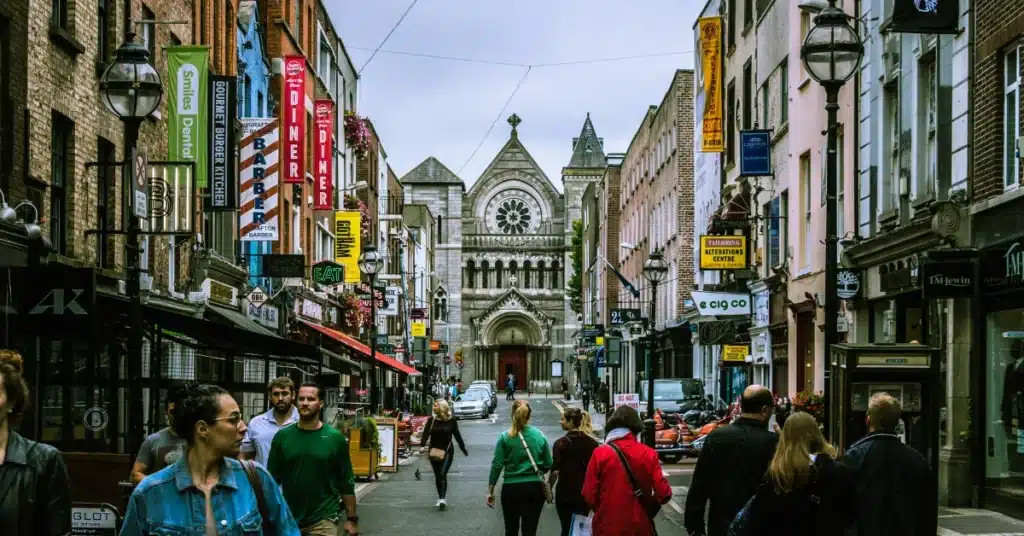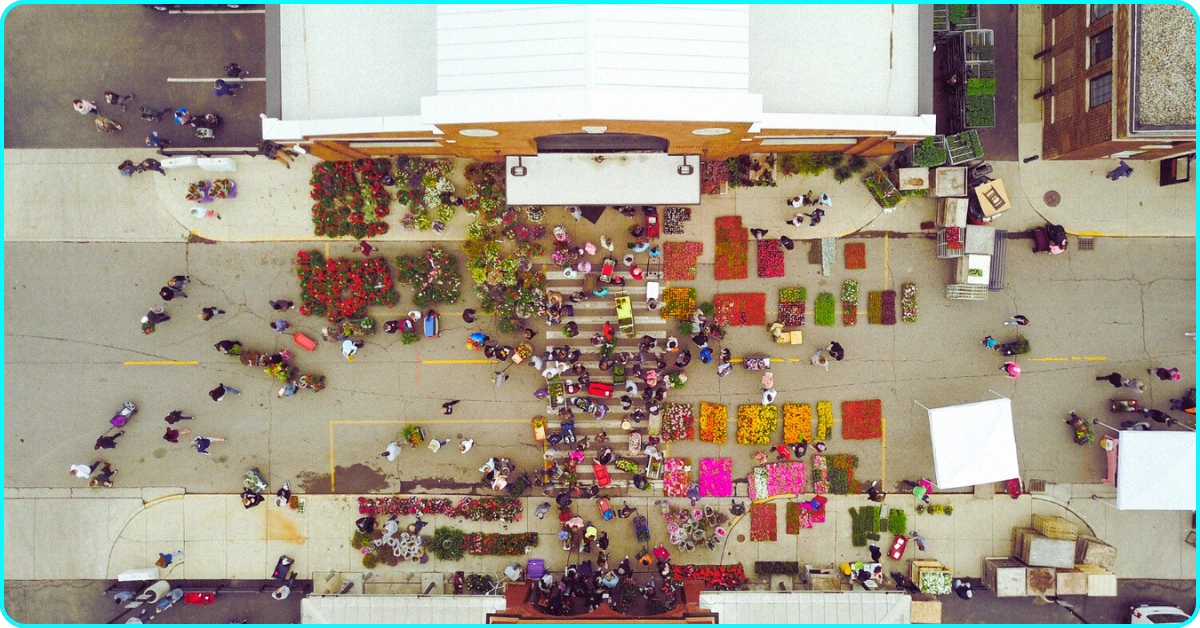Thinking about moving to Ireland? Whether you’re drawn to the lush green landscapes, vibrant culture, or a strong job market, it’s important to ask yourself: Is ireland a good place to live? From its welcoming people to the thriving tech scene, Ireland offers a lot to both tourists and expats. Like any other nation, it has advantages and disadvantages.
In this article, I’ll dive into what makes life in Ireland unique, and whether it’s the right fit for you. Let’s explore the opportunities, challenges, and everything in between so you can make a decision that truly aligns with your life goals.
Is Ireland a Good Place to Live?
So, is Ireland a good place to live? If you ask anyone who’s been there, they’ll probably tell you it’s a mix of magic and modernity. From the rolling green hills to the buzzing city streets, Ireland offers something special. It’s not just about the postcard views either. The people are warm, the job market is thriving, and the lifestyle? Let’s just say it’s got a charm that’s hard to beat.
I remember my first trip to Ireland. It was a quick visit, but something about it stuck with me. The moment I stepped off the plane, I was greeted by this incredible sense of openness. Whether in a bustling Dublin café or a quiet corner of Galway, people were just… friendly. It felt like a place where you could truly connect, whether you were a local or just passing through.
And let’s talk about the scenery if you’ve ever seen a picture of Ireland, you’ve seen how lush and beautiful it is. The wild coastline, the misty mornings, and the emerald hills it’s all as beautiful as advertised. But it’s not just the views that make it so appealing; it’s the vibe of the place. Ireland’s blend of rich history, modern cities, and natural beauty creates a lifestyle that feels balanced.
Of course, there are additional factors to take into account. From a career perspective, Ireland is thriving. With a booming tech industry, especially in cities like Dublin, it’s a great spot if you’re looking to build a career. But, as with any place, there are trade-offs. The weather can be a downer (rain, rain, and more rain), and while Ireland’s cost of living isn’t sky-high like some European cities, it can still surprise you especially in Dublin.
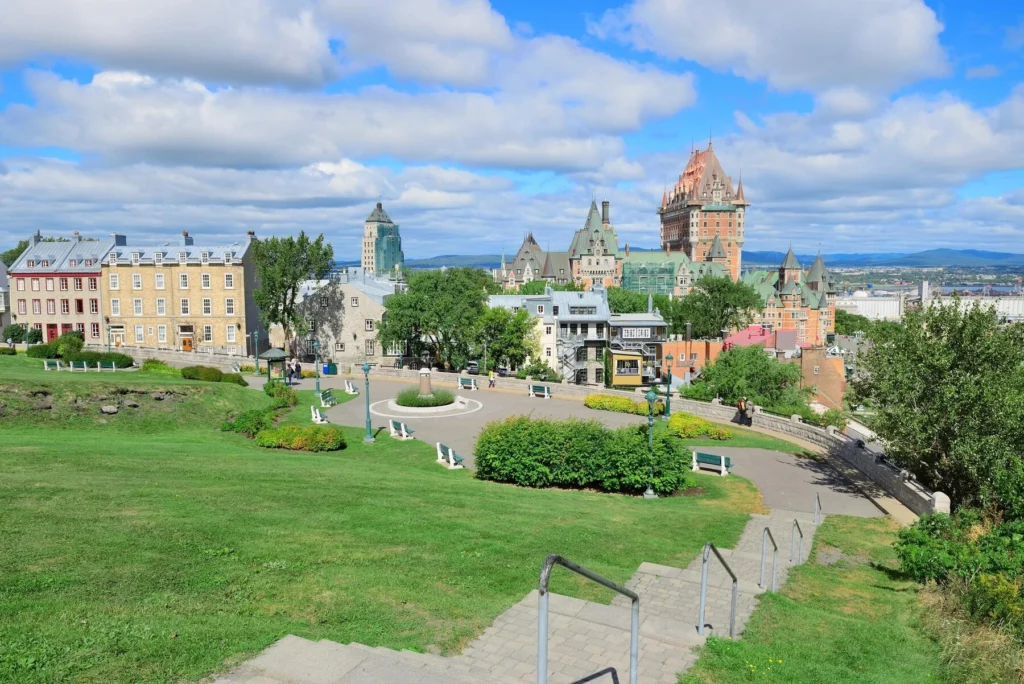
Advantages of Living in Ireland
Living in Ireland isn’t just about the breathtaking landscapes it’s about a lifestyle that’s rich in community, balance, and opportunity. From the famous friendliness of the Irish people to the booming job market, there’s so much to love. Let me share the key benefits that make Ireland an appealing destination.
Friendly People & Welcoming Culture
Let’s start with the Irish themselves. People here are genuinely friendly, and that’s not an exaggeration. I’ve experienced it firsthand: whether you’re in a busy café in Dublin or a quiet pub in a small town, you’ll be met with open arms. The Irish have this natural charm and ease that makes you feel at home, almost instantly.
Key Points:
- Warmth & Friendliness: People will often stop and chat with you, whether you’re a local or a foreigner.
- Strong Sense of Community: Expats feel accepted, and there’s a real emphasis on helping newcomers settle in.
- Great for Social Connections: Whether through social clubs, festivals, or even casual conversations, building relationships is easy.
Work-Life Balance
When it comes to work-life balance, Ireland nails it. People here know how to work hard, but they also know how to enjoy their free time. It’s not about squeezing as much into a day as possible it’s about quality over quantity. I’ve found that working in Ireland means less stress and more time to enjoy life.
Key Points:
- Flexibility: Many workplaces offer flexible hours, remote work options, and generous vacation time.
- Public Holidays & Time Off: There are more public holidays than in many other European countries, and employees genuinely take their time off.
- Less Burnout: The emphasis on balancing work with personal life means less pressure to be “always on.”
High Quality of Life
It’s hard to beat Ireland when it comes to natural beauty and a relaxed pace of life. Whether you’re living in the hustle of Dublin or a quieter village, you’ll have access to clean air, green spaces, and a slower pace that can help you recharge. I’ve personally noticed how much easier it is to feel at peace here compared to the fast-paced cities I’ve lived in before.
Key Points:
- Beautiful Scenery: The rolling hills, rugged coastline, and vibrant cities offer constant access to nature.
- Slower Pace: Life isn’t about rushing; it’s about enjoying the journey. No one is in a hurry, and there’s a comfortable rhythm to life.
- Outdoor Living: With so many trails, parks, and coastal paths, there’s always an opportunity to get outdoors.
Public Healthcare
Ireland’s public healthcare system is available to all residents and is funded through taxes. While it’s not perfect waiting times for certain non-emergency treatments can be long it’s a lot more accessible compared to places like the US, where medical bills can skyrocket. The system offers a great safety net, especially for those who need urgent care.
Key Points:
- Affordability: Public healthcare is free or low-cost for residents, which is a big plus.
- Emergency Care: You’ll get treated in an emergency, and hospitals are well-equipped to handle urgent cases.
- Private Health Insurance: Many opt for private health insurance to bypass long waiting times and access quicker treatments.
Strong Economy & Job Opportunities
Ireland is a hotspot for global industries, especially tech and healthcare. With major tech companies like Google, Facebook, and Apple headquartered here, there are plenty of opportunities for skilled workers. Dublin is a global tech hub, but other cities like Cork and Galway are also growing, making Ireland a great place for professionals, freelancers, and entrepreneurs.
Key Points:
- Tech Industry Boom: Companies like Google, Facebook, and Twitter have major offices in Dublin, creating a huge demand for tech talent.
- Healthcare & Finance: There’s also strong growth in healthcare, finance, and pharmaceuticals, with plenty of roles available for skilled workers.
- Entrepreneurial Support: The government offers grants, tax breaks, and support for entrepreneurs, making it easier to start a business here.
- Freelancer-Friendly: With a good infrastructure for remote work and a thriving gig economy, Ireland is perfect for freelancers.

Disadvantages of Living in Ireland
While Ireland has a lot to offer, there are definitely some downsides that anyone considering a move should keep in mind. It’s not all rolling hills and cozy pubs. Some of the challenges might surprise you, especially if you’re coming from a place with a different pace of life or infrastructure. Let’s dive into a few of the key drawbacks.
Cost of Living
First off, let’s talk about money. If you’re thinking of moving to Dublin, brace yourself housing prices are no joke. The rent here can be insane. It’s one of the main reasons why so many people, including myself, end up with roommates longer than we’d like to admit. The further you get from Dublin, the better, but even in cities like Cork or Galway, the cost of living is creeping up.
When I first moved, I was shocked by how expensive things like groceries and eating out could be. Sure, you’re paying for quality, but it’s definitely pricier than many other parts of Europe. If you’ve lived in places like Spain or Portugal, Ireland might give your wallet a little more of a workout.
Key Points:
- High Rent Prices: Dublin, in particular, has a very competitive rental market.
- Expensive Groceries & Dining: Day-to-day expenses, especially eating out, can be pricier than in some other European countries.
- Affordable Outside Cities: Rural areas and smaller towns tend to be cheaper for housing, but you’ll pay for that with fewer amenities.
Weather
Okay, let’s get the weather out of the way. If you’ve heard anything about Ireland, you’ve probably heard about the rain and let me tell you, it’s true. It rains a lot. I’m talking misty, drizzle-type rain that just doesn’t seem to end.
There’s something oddly soothing about it, but after a few months, it can start to wear on you. The days can be short in winter, and with the clouds overhead, the lack of sunlight can affect your mood. Personally, I found it a little hard to adjust at first especially in those long stretches of gray skies.
I was used to sunnier weather, and it took some time to get used to the endless overcast days. So if you’re the type who thrives on sunshine, you might find yourself needing to make peace with the weather or invest in a good umbrella (or both).
Key Points:
- Frequent Rain: Expect rain and drizzle for much of the year.
- Short Winter Days: During the winter, daylight hours are limited, which can affect your mood.
- Cloudy Skies: The weather is often gray and overcast, which might take time to adjust to.
Healthcare Wait Times
Now, the healthcare system in Ireland is pretty solid overall, but let’s not sugarcoat everything it does have its flaws. Public healthcare, which is available to all residents, is generally affordable, but the wait times can be brutal. I’ve had a few friends experience long delays for non-emergency treatments. It’s not uncommon to wait several months for a specialist appointment.
If you’re in need of something more immediate, you’ll either be waiting for an urgent care slot or paying for private healthcare to skip the line. The public system offers great support in emergencies, though, so that’s a big plus.
Key Points:
- Long Wait Times: Especially for non-emergency treatments and specialist appointments.
- Private Insurance: Many opt for private insurance to bypass long waits.
- Emergency Care: Great for urgent care hospitals are well-equipped for emergencies.
Traffic & Public Transport
Dublin’s traffic is a nightmare. The streets can be clogged with cars, buses, and cyclists at all hours, and getting stuck in a traffic jam is a regular occurrence. I personally found it exhausting, especially when I had to commute every day. The public transport system in Dublin isn’t bad it gets you where you need to go, but it can be packed, unreliable at times, and slow.
And once you get out of Dublin, things start to fall apart a bit. Public transport outside of the major cities is limited, so if you’re planning on living in a smaller town or rural area, you’ll likely need a car to get around.
Key Points:
- Heavy Traffic in Dublin: Commuting can be stressful due to congestion in the capital.
- Limited Public Transport: Smaller towns and rural areas have minimal or no public transport options.
- Cycling is a Good Alternative: Biking can be an easier and faster way to get around in cities.
Limited Diversity in Some Areas
Ireland, especially in rural areas, can feel a bit homogenous at times. While the bigger cities like Dublin and Cork are growing and becoming increasingly diverse, smaller towns still have a very “Irish” vibe. I’ve talked to a few expats who’ve moved to places outside the major cities and felt a bit isolated due to the lack of multicultural communities.
If you’re someone who thrives in diverse environments or likes to have access to various cultural communities, you might find yourself longing for a bigger melting pot.
Key Points:
- More Homogeneous in Rural Areas: Smaller towns may feel a bit more “Irish” and less multicultural.
- Diverse in Larger Cities: Dublin, Cork, and Galway are becoming more diverse and welcoming for internationals.
- Social Isolation: Some expats in smaller towns struggle with finding diverse communities.

Is It Worth Living in Ireland?
So, you’re thinking, “Is Ireland really worth it?” I get it. It’s easy to get caught up in the beauty, the people, and the job opportunities that Ireland offers but there’s more to the story than just those emerald hills and Guinness pints.
The truth is, whether or not it’s a good fit for you depends on a lot of factors: your lifestyle, your job, your personality, and even your tolerance for weather (we’ll talk about that later).
Personal Opinion
From my experience, Ireland offers an amazing quality of life, but it’s not for everyone. The charm of this place definitely shines through the minute you step off the plane the landscape, the history, the vibe but if you’re looking for perfection, Ireland might not tick every box.
The people are incredibly warm and welcoming, and the job market is fantastic if you’re in the right industry. But, like anywhere, it has its quirks. The weather? Definitely a challenge for those who thrive on sunshine. And don’t even get me started on the cost of living in Dublin!
So, who is Ireland a good fit for? Young professionals flock here, especially in tech, finance, and healthcare, because there’s always something happening. Freelancers and remote workers also thrive here, as there’s a strong infrastructure for both.
Retirees? Sure, the pace of life here is slower, which can be appealing, but be mindful of the cost of living if you plan to settle near major cities. For me, it’s about balance finding a lifestyle that aligns with what you value most.
Overall Quality of Life
When you step back and look at the overall quality of life in Ireland, the positives far outweigh the negatives. Yes, the weather can be gloomy, and yes, Dublin can drain your bank account faster than you can say “top of the morning.” But there’s a lifestyle rhythm here that you just won’t find in many other countries.
The pace of life is slower, which is an absolute breath of fresh air for anyone who’s tired of the 24/7 hustle culture in big cities like London or New York. People genuinely take time off to enjoy life, which means you’re not living to work you’re working to live.
Ireland also has that community spirit. Whether you’re in a small town or a big city, the sense of connection is strong. The Irish are friendly, and there’s an inherent openness about them that makes it easy to feel at home, even if you’re thousands of miles away from where you grew up.
I’ve found it easy to meet people, join local events, and immerse myself in Irish culture something that’s not always possible in other countries.
Is Ireland a Good Place to Live for Immigrants?
Ireland is quite welcoming to immigrants, especially in cities like Dublin, Cork, and Galway, where you’ll find diverse communities and international expat groups. People here are generally open-minded, and the government has worked hard to create a supportive environment for those coming from abroad.
That said, it’s important to note that integration can take time, especially if you’re moving to a rural area. The language barrier isn’t a huge issue, since almost everyone speaks English, but you might come across situations where understanding the Irish language (Gaelic) could be helpful, though it’s not essential for daily life.
When I first moved here, I was a bit worried about how I would fit in. But after joining a few social clubs and attending local events, I realized the Irish are incredibly inclusive. And there are plenty of support systems for immigrants, from cultural centers to language classes if you want to learn Irish (or just understand the locals better). So, if you’re an immigrant, the key is finding your tribe whether that’s other expats or locals and integrating at your own pace.
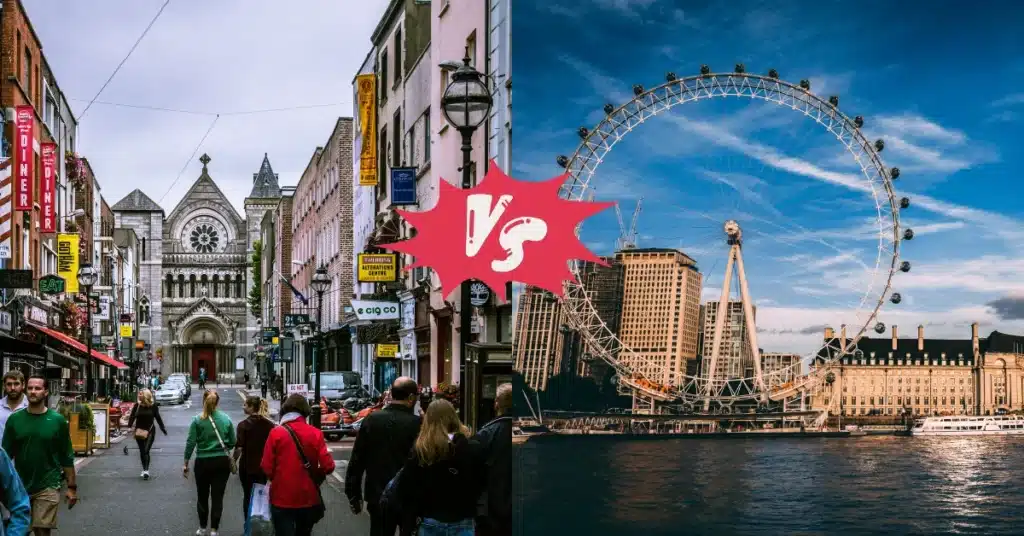
Ireland vs UK: Which is Better to Live In?
Choosing between Ireland and the UK? It’s kind of like picking between two cousins. Both are great, but they’re different in some ways. Let me break it down for you, based on my experience living in both places.
Cost of Living
First, let’s talk about money. In short, both countries can be expensive, but Ireland is a little more costly, especially in Dublin. Rent in Dublin can feel like you’re paying for a piece of sky. But in the UK, London also carries a big price tag. Outside of the big cities, both countries offer cheaper living, but you might find more affordable options in the UK if you’re looking for a smaller town.
Food? Well, a pint of Guinness will cost you about the same in both places, but eating out in Ireland is often pricier. If you cook at home, both countries are pretty similar, though.
Weather & Environment
Let’s get to the weather. Ireland gets a lot of rain. I mean, a lot. But it’s not as harsh as some parts of the UK. The weather stays fairly mild year-round, which is nice if you’re not a fan of freezing winters. In the UK, the weather can be more unpredictable. Some places get real cold, others stay more temperate.
But no matter where you are, both countries are green. Ireland’s countryside? Absolutely stunning. But the UK has its own charm, with places like the Lake District and Scottish Highlands.
Cultural & Social Life
Now, the fun part culture and social life. Ireland has a certain magic. People here are so friendly. In every pub or café, it’s like you’re a local, even if it’s your first time visiting.
The UK, however, is huge. It’s diverse, with so many different cultures and traditions. If you’re into meeting people from all over the world, the UK might be the place. But if you love a smaller, tight-knit community vibe, Ireland feels more like home.
Healthcare System
Okay, healthcare. The UK has the NHS, and it’s free. Well, mostly. You’ll pay for some things through taxes, but it’s very accessible. The downside? Waiting times. They can be long. Ireland’s public healthcare isn’t free, but it’s cheaper than private insurance. You might have to wait for some services, but there’s always the option of going private for faster care.
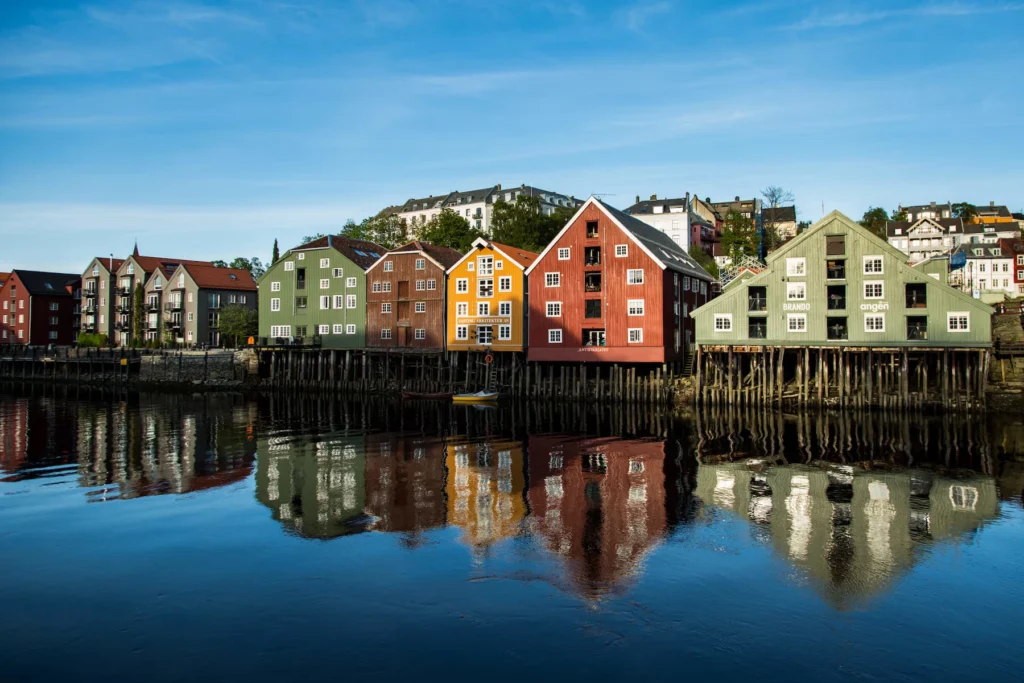
Which Part of Ireland Is Best to Live In?
Choosing where to live in Ireland can feel like picking a favorite among your favorite things. Each place has its own vibe whether you’re drawn to the buzz of the city, the charm of a small town, or the peace of the countryside. Here’s a breakdown of some of the most popular spots, from Dublin to the quieter corners of rural Ireland. Let’s dive in!
Dublin
Dublin is where the action is. If you’re someone who thrives in a city with endless career opportunities, a lively social scene, and lots to do, this is your place. I’ve lived here for a while, and the energy is contagious. Whether it’s grabbing a pint in a pub, catching a gig at a local venue, or getting lost in the winding streets, there’s always something happening.
Dublin is a major hub for tech, finance, and healthcare, so job opportunities are abundant, especially if you work in one of those industries.
But…the cost of living is no joke. Rent in Dublin is sky-high, especially if you want to live close to the city center. You’ll have to budget wisely, because your paycheck can quickly vanish into the rent and utilities. Plus, Dublin’s always buzzing, which means it can feel a bit crowded, especially on weekends.
Still, if you’re okay with the hustle and bustle and the cost of living, Dublin offers a lot just be prepared to pay for it.
Cork
Now, if you like the idea of a city with a vibrant feel but without the insane rent prices of Dublin, Cork might be more your speed. It’s often called Ireland’s “second city,” and I totally get why. Cork is growing fast, and there’s a great mix of cultural events, live music, and pubs, but it’s not quite as overwhelming as Dublin. Plus, it’s definitely more affordable.
The vibe in Cork is relaxed but still energetic. I love how it feels like a small city with a big heart. You’ve got the modern amenities and the cool city feel, but it’s not so fast-paced that you’re constantly running around. Whether you’re into food, arts, or just hanging out with friends, Cork gives you a taste of everything without the sky-high prices.
Limerick, Galway, and Other Cities
If you’re after something a bit quieter but still with all the conveniences of city life, smaller cities like Limerick and Galway are worth considering. I’ve visited both, and they each have a unique charm. Galway, especially, has this bohemian, artsy vibe that’s perfect for people who love creativity and community.
Limerick has undergone a lot of positive changes in recent years and is now a pretty cool place to be especially if you like a mix of history and modern development.
Living in these cities gives you that perfect balance of having things to do without the hustle of Dublin. Rent is cheaper, the pace of life is slower, and there’s a strong sense of local community. You won’t feel overwhelmed, and it’s still easy to make connections. If you don’t mind being in a smaller city with fewer job opportunities than Dublin, but with a more laid-back feel, this could be your spot.
Rural Ireland
If you’ve ever dreamed of waking up to rolling hills, quiet roads, and friendly neighbors, rural Ireland might just be your perfect escape. I’ve spent some time in the countryside, and there’s something special about the stillness and natural beauty. The cost of living here is much lower, and the sense of community is stronger than anywhere else. People know each other by name, and there’s a real warmth to rural living.
However, there’s a trade-off. While the peaceful life is amazing, rural areas do come with fewer job options, especially in niche industries. Public transport is more limited too, so having a car is a must. If you’re okay with slower internet speeds and not as many social activities, rural Ireland offers a more serene way of life.
So, Which Part of Ireland Is Best for You?
It all depends on what you’re looking for. If you’re all about career opportunities and a buzzing city, Dublin might be your best bet. If you want a city that’s a little more affordable with a relaxed vibe, Cork is calling your name. Smaller cities like Galway and Limerick are perfect if you want city life with a slower pace. And, if you’re seeking a peaceful escape surrounded by nature, rural Ireland is where you’ll find your zen.
No matter where you choose, Ireland’s sense of community and stunning landscapes will always make you feel at home. Just pick the place that matches your lifestyle, and you’ll find your rhythm in this beautiful country.

Is Ireland a Good Place to Live for Muslims?
Islamic Communities
So, is Ireland a good place for Muslims to live? In my experience, yes, it definitely is. Ireland has a growing Muslim community, especially in cities like Dublin, Cork, and Galway. You’ll find mosques, halal food, and a decent variety of halal stores. In fact, Dublin has several mosques, and you can easily find halal markets stocked with all the essentials whether you’re looking for meats, snacks, or even spices from home.
It’s comforting to know that you can maintain your cultural practices, whether it’s celebrating Eid or finding a place to pray.
One thing that stood out to me when I first arrived was the sense of community. It wasn’t just about religion, but the warmth that the Muslim communities shared with each other. It made it so much easier to feel like you belong, even if you’re thousands of miles from where you grew up.
The Irish people, in general, are pretty open-minded and curious about other cultures, so they’re often more than willing to learn and engage with Islamic traditions.
For example, I’ve met many Muslims who have found incredible support in the community here. Local cultural centers and mosques often host events or social gatherings, which helps build bridges and offer a sense of connection. If you’re planning on making Ireland home, you’ll definitely find a place where you feel seen and heard.

Is Ireland a Good Place to Live for Foreigners?
Cultural Integration
If you’re a foreigner thinking about making the move to Ireland, you’ll be happy to know that integration here is pretty smooth. I’ll be honest, the Irish are some of the friendliest people you’ll ever meet. From day one, I noticed how open and welcoming they are, especially in places like Dublin and Cork, where you’ll find a big mix of cultures.
The government has also set up lots of support systems for foreigners, from integration programs to social clubs for international communities.
But beyond the official structures, it’s the little things that make a big difference. You’ll find a strong sense of belonging, whether it’s through meeting other expats, joining a local event, or simply chatting with a neighbor. It’s the kind of place where people will take time out of their day to ask how you’re doing, and that small-town warmth is everywhere even in larger cities.
Language Barrier
Now, let’s talk about the language barrier. Don’t stress! English is the primary language here, so communication is generally a breeze. You’ll hear a bit of Irish (Gaelic) here and there usually on road signs or in schools but it’s not something that’ll impact your daily life.
Honestly, most Irish people are more than happy to chat in English, and they do love their accents, so if you’ve got one, it’s just an added bonus.
If you’re coming from a non-English-speaking country, don’t worry. I’ve met plenty of people from all over the world Poland, Spain, India and they’ve had no trouble adapting to life in Ireland. It really does feel like an international hub where you can find people who understand your background and share similar experiences.

Living in Ireland and Working in Ireland: The Perfect Combo
Job Market Insights
When it comes to work, Ireland is an absolute gem especially if you’re in tech, healthcare, or education. I moved here for work and was surprised by how quickly I settled into a job. Ireland is home to some of the world’s biggest companies, especially in tech Google, Facebook, and Apple all have major offices in Dublin.
The job market is booming for tech professionals, but the opportunities don’t stop there. Whether you’re into finance, healthcare, or even education, you’ll find that the market is competitive but rewarding.
As for salaries, they’re pretty decent, but the cost of living in cities like Dublin can take a chunk of it. So, while you might land a good-paying job, be prepared for high rent prices, especially if you want to live close to the action. But don’t let that discourage you if you’re strategic with your housing choices, you can find a place that balances affordability and proximity to your workplace.
Visa & Residency Information
The visa and residency process is fairly straightforward if you’re coming from outside the EU. For work visas, Ireland is pretty generous, especially for skilled workers. I went through the work permit process myself, and although it took some time, the whole process was manageable with the right documents.
Once you’re settled, it’s also possible to apply for permanent residency after a certain period (usually five years, depending on your work permit type). If you’re planning to stay long-term, the opportunity is there, and you’ll be guided through the process.
Living and working in Ireland is a great combination. The work-life balance here is refreshing, and there’s always something to do outside of work, from hiking to beach days or exploring historic towns. It’s not just about finding a job it’s about creating a lifestyle that feels good to you. If you’re considering making the move, Ireland is a place where work and play go hand in hand.
Conclusion
Living in Ireland? It’s a big decision, no doubt. When I first considered it, I was torn. The rolling green hills, the warmth of the people, and the job opportunities had me excited. But I also knew there’d be some trade-offs. The weather can be a challenge, and cities like Dublin are expensive.
Here’s the thing: Ireland has a way of pulling you in. There’s something special about the slower pace of life and how easy it is to build a community here. Whether you’re into hiking, pub culture, or just enjoying the quiet moments, Ireland offers a lifestyle you won’t find in many places. Sure, it has its flaws, but the charm is real.
Before you make the move, think about what matters most to you. Are you okay with a bit of rain? Can you handle the higher cost of living in cities like Dublin? Ireland isn’t perfect, but for me, it feels like home. The balance of work, life, and community has made a huge difference in how I feel about my day-to-day life.
I’d love to hear from you! Have you lived in Ireland, or are you thinking about it? Leave a remark with your ideas or queries. Whether you’re on the fence or ready to pack your bags, let’s talk about it!
Frequently Ask Question
Is it easy to find a job in Ireland?
Finding a job in Ireland can vary depending on your field, experience, and location. Dublin, as the capital, has the most job opportunities, especially in tech, finance, and pharmaceuticals. If you’re skilled in these areas, the job market is generally welcoming. However, other cities like Cork and Galway may have fewer positions, but the competition can also be less intense. Be prepared to network, apply widely, and have your CV tailored to Irish job standards.
What are the key industries with the highest demand for workers in Ireland?
Ireland has a high demand for workers in industries such as technology, pharmaceuticals, finance, and healthcare. Tech companies like Google, Facebook, and Apple have major offices in Dublin, so software developers, engineers, and IT professionals are in high demand. Additionally, roles in healthcare, such as nurses and doctors, are always sought after. Finance and accounting jobs are also plentiful due to Ireland’s position as a global financial hub.
How much money do I need to live in Ireland?
It can be costly to live in Ireland, particularly in places like Dublin. A single person can expect to spend around €1,500 to €2,000 a month on rent, food, transportation, and other basic costs. Outside of Dublin, you might find lower living costs, but it can still be pricey in places like Cork and Galway. It’s a good idea to budget at least €2,500 to €3,000 per month for a comfortable lifestyle in Dublin, with slightly less required in other areas.
Is healthcare free in Ireland?
Ireland offers public healthcare, but it’s not entirely free. There is a system of “medical cards” for low-income residents that can cover most healthcare costs, but most people pay for healthcare services, including GP visits, hospital treatment, and prescriptions. Private health insurance is common for quicker access to healthcare and more extensive coverage. If you’re moving to Ireland, it’s a good idea to familiarize yourself with the public health system and consider private insurance if needed.

